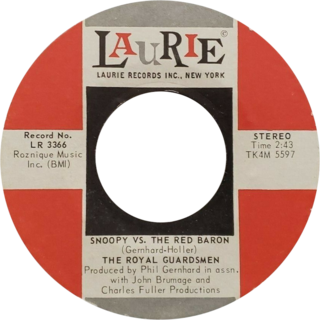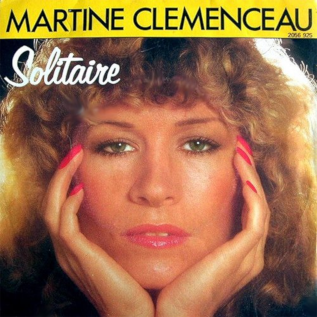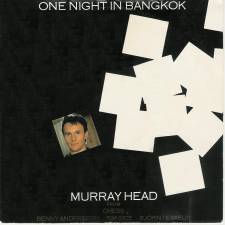"Canada" (also known as "Ca-na-da" or "The Centennial Song", French version "Une chanson du centenaire") was written by Bobby Gimby in 1967 to celebrate Canada's centennial and Expo 67, and was commissioned by the Centennial Commission (a special Federal Government agency). [1] The song was written in both of Canada's official languages, English and French.
The song's recording was performed by the Young Canada Singers, two groups of children — one that sang the French lyrics, led by Montreal conductor Raymond Berthiaume, and another that sang in English, under conductor Laurie Bower [2] in Toronto. [3] The song was composed by Bobby Gimby. The song was recorded at Hallmark Recording Studios in Toronto, and the 45 rpm release was manufactured for the Centennial Commission by Quality Records Ltd. The single was the most successful single in Canada in 1967, selling a then unprecedented 270,000 copies. [3] It was No. 1 for 2 weeks on the RPM Top 100 Singles in Canada, in April 1967. [4]
In 1971, Gimby donated all royalties to the Boy Scouts of Canada, but the song only earned one cent per airplay, which is one of the lowest rates in the world. Since its release, the song has been recorded by over 30 different musicians.
Canadian comedian and impressionist Rich Little recorded a version of the song, also in 1967, in which he performed the lyrics while impersonating then-Prime Minister Lester B. Pearson and former Prime Minister John Diefenbaker. Little's version was released in March 1967 on the Allied Records label (AR 6350), one month after the original single.
In the Canadian/British animated television show Bob and Margaret , the Centennial Song is loudly and crudely sung by the wife of Bob's cousin while showering.
The song is sung as a continuous round. Although both English and French versions of the lyrics were produced, they are both bilingual. In the English version, the English verse is sung first, followed by the chorus in English, and then the French verse. In the French version, the order of the verses is reversed, and the first chorus is sung in French. The second, bilingual, chorus is the same for both versions, with the exception of the last line.
| English Version | French Version |
|---|---|
|
|
In recognition of writing the song, Gimby was among the first cohorts of the Order of Canada, the country's highest civilian award which was established as part of the Centennial. He was named an Officer of the Order, with "Canada" cited by title as a reason for the recognition. [5]
"A Place to Stand, a Place to Grow" (Ontari-ari-ari-o!) is the unofficial provincial anthem of the Canadian province of Ontario. It was written as the signature tune for a movie of the same name that was featured at the Expo 67 Ontario pavilion.
"Blue Moon" is a popular song written by Richard Rodgers and Lorenz Hart in 1934 that has become a standard ballad. Early recordings included those by Connee Boswell and by Al Bowlly in 1935. The song was a hit twice in 1949, with successful recordings in the U.S. by Billy Eckstine and Mel Tormé.

Robert Stead Gimby, OC was a Canadian orchestra leader, trumpeter, and singer-songwriter.

"The Night the Lights Went Out in Georgia" is a Southern Gothic murder ballad, written in 1972 by songwriter Bobby Russell and first recorded by his then-wife singer, comedian and actress Vicki Lawrence. Lawrence's version, from her 1973 album of the same title, went to number one on the US Billboard Hot 100 chart after its release. Of several cover versions, the one recorded by Reba McEntire for her 1991 album For My Broken Heart peaked at number 12 on the Hot Country Songs chart.
"Sing" is a 1971 song written by Joe Raposo for the children's television show Sesame Street as its signature song. In 1973, it gained popularity when performed by the Carpenters, a number 3 hit on the Billboard Hot 100.

"The Cat Came Back" is a blues-folk gallows comedy song written by Harry S. Miller in 1893. It has since entered the world of folklore and became a famous children's song.

"Sky Pilot" is a 1968 song by Eric Burdon & the Animals, released on the album The Twain Shall Meet. When released as a single the song was split across both sides, due to its length (7:27). As "Sky Pilot " it reached number 14 on the U.S. pop charts, number 15 on the Canadian RPM chart, and number 7 on Canada's CHUM Chart.
"Quando quando quando" is an Italian pop song from 1962, in the bossa nova style, with music written by Tony Renis and lyrics by Alberto Testa. The song, originally recorded in two different versions by Tony Renis and Emilio Pericoli, competed in the Sanremo Music Festival in 1962, where it placed fourth, and later became a commercial success in Italy, topping the Musica e dischi singles chart. American entertainer Pat Boone, who recorded the song in 1962, sang the English lyrics written by Ervin Drake.
"Ringo" is a popular song written by Don Robertson and Hal Blair. It was a hit single for Canadian-born actor Lorne Greene in 1964. It reached #1 on the U.S. Billboard charts on December 5, 1964, as well as garnering the same spot on the "Easy Listening" chart, where it retained the position for six weeks. The single also peaked at #21 on the Hot Country Singles chart. In Canada, it hit #1 on the RPM top singles chart on December 7, 1964.

"Snoopy vs. the Red Baron" is a novelty song written by Phil Gernhard and Dick Holler and recorded in 1966 by the Florida-based pop group The Royal Guardsmen. The song was recorded at the Charles Fuller Productions studio in Tampa, Florida, and was released as a single on Laurie Records. Debuting at #122 on the Bubbling Under the Hot 100 on December 10, 1966, the single skyrocketed to #30 on December 17, 1966, shot up again to #7 on December 24, 1966 and peaked at #2 on the Hot 100 during the week of December 31, 1966 ; made #6 on the Record Retailer (UK) chart in February 1967; was #1 in Australia for 5 weeks from February 1967; and #1 for 3 weeks in Canada. On the Hot 100, "Believer" at #1 kept "Snoopy" at #2 from reaching the Hot 100 summit from December 31, 1966, through January 21, 1967, after which "Snoopy" fell off while "Believer" stayed at the top for another 3 weeks; however the song spent one week at the top of the Record World charts. The song sold close to three million copies.

"Solitaire" is a 1981 song sung and written by Martine Clémenceau. The English version was later released in March 1983 as the lead single of American singer Laura Branigan's second studio album, Branigan 2 (1983). It was lyricized in English by Diane Warren and produced by Jack White and Robbie Buchanan.

"Milord" or "Ombre de la Rue" is a 1959 song, famously sung by Édith Piaf.

"God Defend New Zealand" is one of two national anthems of New Zealand, the other being "God Save the King". Legally the two have equal status, but "God Defend New Zealand" is more commonly used. Originally written as a poem, it was set to music as part of a competition in 1876. Over the years its popularity increased, and it was eventually named the second national anthem in 1977. It has English and Māori lyrics, with slightly different meanings. Since the late 1990s, the usual practice when performed in public is to perform the first verse of the national anthem twice, first in Māori and then in English.

"Sentimental Lady" is a song written by Bob Welch. It was originally recorded for Fleetwood Mac's 1972 album Bare Trees, but was re-recorded by Welch on his debut solo album, French Kiss, in 1977. It is a romantic song, originally written for Welch's first wife. Welch recorded it again in 2003 for his album His Fleetwood Mac Years & Beyond.
"Baby Face" is a popular Tin Pan Alley jazz song. The music was written by Harry Akst, with lyrics by Benny Davis, and the song was published in 1926.

"One Night in Bangkok" is a song from the concept album and subsequent musical Chess by Tim Rice, Benny Andersson, and Björn Ulvaeus. English actor and singer Murray Head raps the verses, while the chorus is sung by Anders Glenmark, a Swedish singer, songwriter, and producer.

"And When I Die" is a song written by American singer and songwriter Laura Nyro. It was first recorded by the folk group Peter, Paul and Mary in 1966. Nyro released her own version on her debut album More Than a New Discovery in February 1967.

Patriotic music in Canada dates back over 200 years as a distinct category from British or French patriotism, preceding the first legal steps to independence by over 50 years. The earliest, "The Bold Canadian", was written in 1812.
The Sugar Shoppe was a Canadian sunshine pop vocal group that recorded in the 1960s and featured actor Victor Garber.
"Pink Shoe Laces" is a song composed by Micki Grant that was recorded by Dodie Stevens, accompanied by Bobby Hammack and his Orchestra, and released as a single in 1959 on Crystalette Records, a record label distributed by Dot Records. Although the verses are delivered with a musical quality, they are not sung in the style of the chorus. Some commentators have observed that the verses are spoken rather than sung.